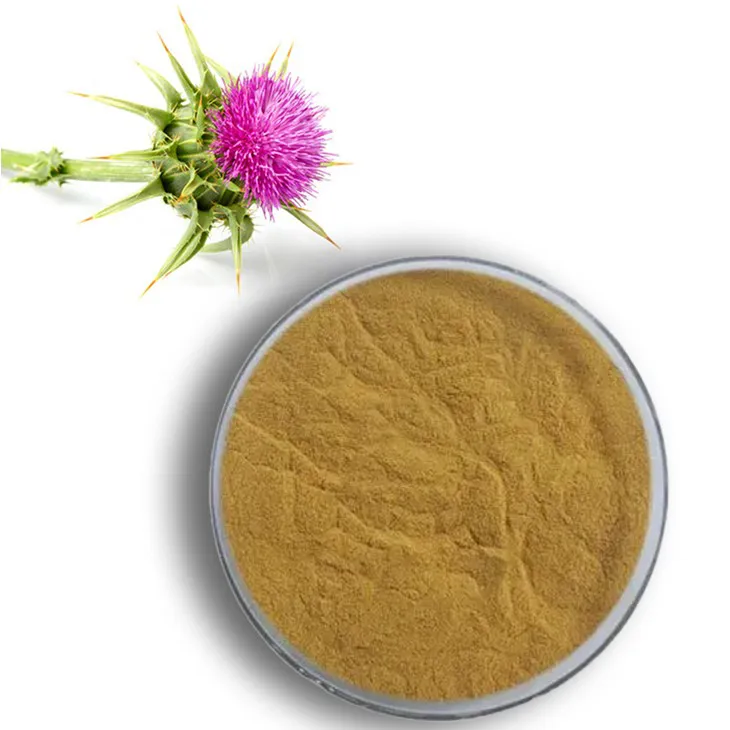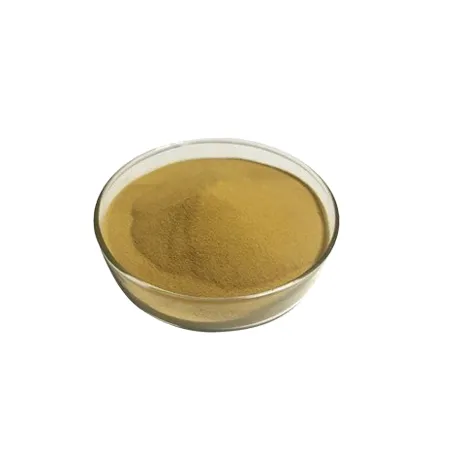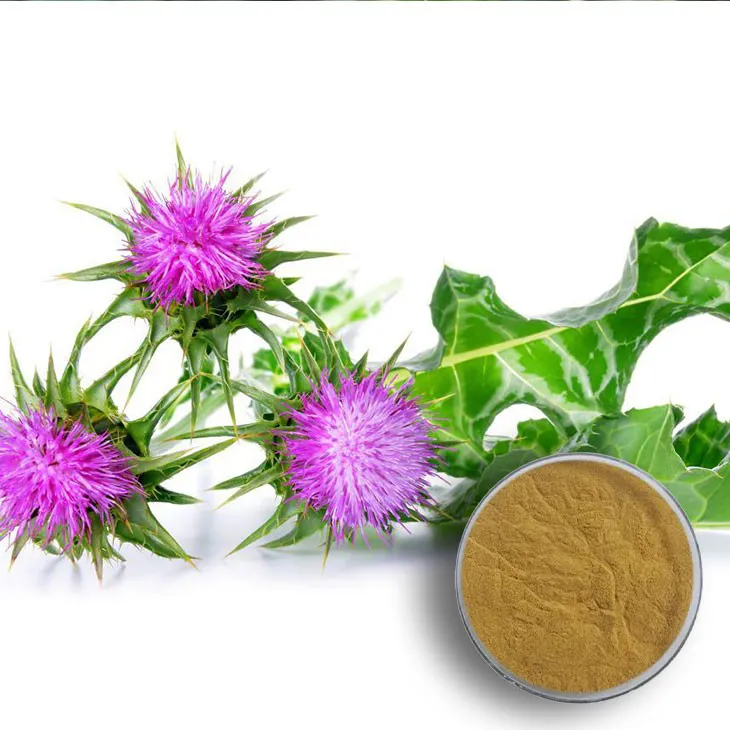- 0086-571-85302990
- sales@greenskybio.com
What is milk thistle extract? Definition, types, history and nutritional value.
2024-12-18

1. Definition of Milk Thistle Extract
Milk Thistle Extract is a natural substance that is derived from the milk thistle plant (Silybum marianum). This plant is native to the Mediterranean region and has been used for centuries in traditional medicine. The extract contains a complex group of active ingredients, with silymarin being the most well - known and studied component. Silymarin itself is a mixture of flavonolignans, which include silybin, isosilybin, silydianin, and silychristin. These components work together to give Milk Thistle Extract its characteristic properties.

2. Types of Milk Thistle Extract
2.1 Based on Extraction Methods
- Solvent - based extraction: This is one of the most common methods. Different solvents such as ethanol or methanol can be used to extract the active ingredients from the milk thistle plant. The choice of solvent can affect the composition and quality of the extract. For example, ethanol - based extracts may have different solubility characteristics for the various silymarin components compared to methanol - based extracts.
- Supercritical fluid extraction: This is a more advanced and "greener" extraction method. Supercritical carbon dioxide is often used as the extraction fluid. It has the advantage of being able to selectively extract the desired components while leaving behind unwanted impurities. This method can produce a purer and more concentrated milk thistle extract, with better preservation of the bioactive compounds.
2.2 Based on Composition and Concentration
- Standardized extracts: These are formulated to contain a specific amount of silymarin or other key components. For example, a standardized milk thistle extract may be guaranteed to contain 80% silymarin. This allows for more consistent dosing and predictable effects in applications such as dietary supplements or herbal remedies.
- Full - spectrum extracts: These contain a wide range of the plant's natural compounds, not just the major ones like silymarin. They may include other flavonoids, phenolic acids, and lipids present in the milk thistle plant. The advantage of full - spectrum extracts is that they may provide a more holistic set of health benefits due to the combined action of all the plant - derived substances.

3. History of Milk Thistle Extract
The use of milk thistle has a long and rich history. It was first mentioned in ancient Greek and Roman texts as a remedy for various ailments. In traditional herbal medicine, it was primarily used for liver - related problems.
3.1 Ancient Times
Dioscorides, a Greek physician in the 1st century AD, described the milk thistle plant and its potential medicinal uses. He noted that it could be used to treat liver and gallbladder disorders. The plant was also used by the Romans, who believed in its detoxifying properties.
3.2 Middle Ages and Beyond
During the Middle Ages, milk thistle continued to be used in European herbal medicine. Monks in particular were known to cultivate and use the plant for treating jaundice and other liver - related symptoms. As knowledge of herbal medicine spread, milk thistle became more widely used across different regions.
3.3 Modern Research and Popularity
In modern times, scientific research has been conducted on milk thistle extract to understand its mechanisms of action and potential health benefits. With the growing interest in natural remedies and alternative medicine, milk thistle extract has gained popularity as a dietary supplement for liver health. It is now available in various forms, including capsules, tablets, and tinctures, in health food stores and pharmacies around the world.

4. Nutritional Value of Milk Thistle Extract
4.1 Liver - Protective Effects
- The flavonolignans in milk thistle extract, especially silybin, have strong antioxidant properties. They can protect liver cells from damage caused by free radicals. Free radicals are highly reactive molecules that can be generated during normal metabolism or due to exposure to toxins such as alcohol, drugs, or environmental pollutants. By neutralizing these free radicals, milk thistle extract helps to prevent oxidative stress in the liver.
- Milk thistle extract also has the ability to stimulate liver cell regeneration. In cases where the liver has been damaged, for example, due to hepatitis or drug - induced liver injury, the extract can promote the growth of new liver cells. This helps in the repair and recovery of the liver function.
- It can enhance the liver's detoxification processes. The liver is responsible for filtering and removing toxins from the body. Milk thistle extract can increase the activity of certain liver enzymes involved in detoxification, such as glutathione peroxidase and superoxide dismutase. This enables the liver to more effectively break down and eliminate harmful substances.
4.2 Anti - Inflammatory Properties
- Chronic inflammation in the liver can lead to various liver diseases, such as non - alcoholic fatty liver disease (NAFLD) and cirrhosis. Milk thistle extract has been shown to have anti - inflammatory effects in the liver. It can reduce the production of inflammatory cytokines, which are signaling molecules that promote inflammation.
- The flavonoids in the extract can inhibit the activation of certain inflammatory pathways in liver cells. For example, they can block the activation of nuclear factor - kappa B (NF - κB), a key regulator of inflammation. By doing so, milk thistle extract helps to keep inflammation in the liver under control.
4.3 Other Potential Health Benefits
- Some studies suggest that milk thistle extract may have benefits for the cardiovascular system. It may help to lower cholesterol levels by inhibiting the absorption of dietary cholesterol in the intestine. Additionally, its antioxidant properties can protect blood vessels from oxidative damage, reducing the risk of atherosclerosis.
- There is also evidence that it may have anti - cancer properties. In vitro and some in vivo studies have shown that certain components of milk thistle extract can inhibit the growth and proliferation of cancer cells. However, more research is needed to fully understand its potential in cancer prevention and treatment.
- Milk thistle extract may also have a positive impact on skin health. Its antioxidant and anti - inflammatory effects can help to protect the skin from damage caused by UV radiation and environmental pollutants. It may also be beneficial for treating skin conditions such as acne and eczema, although further research is required in this area.
5. Conclusion
Milk thistle extract is a natural product with a long history of use and significant potential health benefits. Its diverse range of types, based on extraction methods and composition, allows for different applications in the fields of medicine, nutrition, and cosmetics. While more research is still needed to fully understand all of its mechanisms of action and potential uses, it has already established itself as a popular supplement for liver health. As our understanding of natural remedies and their role in maintaining health continues to grow, milk thistle extract is likely to remain an important area of study and a valuable option for those seeking natural ways to support their well - being.
FAQ:
What are the main active ingredients in milk thistle extract?
The main active ingredients in milk thistle extract are flavonoids, particularly silymarin. Silymarin is a complex of flavonolignans which includes silybin, isosilybin, silychristin, and silydianin. These components are responsible for many of the beneficial effects of milk thistle extract, especially its liver - protecting properties.
How does milk thistle extract protect the liver?
Milk thistle extract protects the liver in several ways. Firstly, its flavonoids can enhance the liver's antioxidant defenses, reducing oxidative stress and lipid peroxidation. This helps to prevent damage to liver cells from free radicals. Secondly, it can stimulate liver cell regeneration, which is important for repairing liver tissue in case of damage. Additionally, it may also increase the liver's ability to detoxify harmful substances by enhancing certain enzymatic activities in the liver.
Are there any side effects of taking milk thistle extract?
Generally, milk thistle extract is considered safe for most people when taken in appropriate doses. However, some possible side effects may include mild digestive issues such as diarrhea, nausea, or abdominal bloating. In rare cases, allergic reactions may occur in individuals who are sensitive to plants in the Asteraceae family. It is also important to note that milk thistle may interact with certain medications, so it is advisable to consult a healthcare provider before starting supplementation, especially if you are taking other medications.
How can one choose the right type of milk thistle extract?
When choosing a milk thistle extract, consider the following factors. Look for products that are standardized to a specific percentage of silymarin, as this indicates the potency of the active ingredient. Also, consider the form of the extract, such as capsules, tablets, or tinctures, based on your personal preference and ease of use. Reputable brands are more likely to provide high - quality extracts. Reading customer reviews and checking for third - party certifications can also help in ensuring the quality of the product.
Can milk thistle extract be used for other health conditions besides liver health?
While milk thistle extract is most well - known for its liver - protecting effects, there is some evidence suggesting potential benefits for other health conditions. For example, it may have anti - inflammatory properties that could be beneficial for conditions related to chronic inflammation. Some studies also suggest that it may have a role in managing diabetes by improving insulin sensitivity, although more research is needed in this area. Additionally, it may potentially help in protecting the kidneys and reducing the risk of certain types of cancer, but again, further research is required to confirm these effects.
Related literature
- The Therapeutic Potential of Milk Thistle (Silybum marianum)"
- "Milk Thistle Extract: A Comprehensive Review of Its Hepatoprotective Mechanisms"
- "Nutritional and Therapeutic Value of Milk Thistle in Health and Disease"
- ▶ Hesperidin
- ▶ citrus bioflavonoids
- ▶ plant extract
- ▶ lycopene
- ▶ Diosmin
- ▶ Grape seed extract
- ▶ Sea buckthorn Juice Powder
- ▶ Beetroot powder
- ▶ Hops Extract
- ▶ Artichoke Extract
- ▶ Reishi mushroom extract
- ▶ Astaxanthin
- ▶ Green Tea Extract
- ▶ Curcumin Extract
- ▶ Horse Chestnut Extract
- ▶ Other Problems
- ▶ Boswellia Serrata Extract
- ▶ Resveratrol Extract
- ▶ Marigold Extract
- ▶ Grape Leaf Extract
- ▶ blog3
- ▶ blog4
- ▶ blog5
-
Pure 85% Tomentil Extract.
2024-12-18
-
Hericium erinaceus extract powder
2024-12-18
-
Kidney Bean Extract
2024-12-18
-
Cocoa Extract
2024-12-18
-
Chasteberry Extract
2024-12-18
-
Ginger Extract
2024-12-18
-
Fenugreek Extract Powder
2024-12-18
-
Maitake Mushroom Extract
2024-12-18
-
Nettle Root Extract
2024-12-18
-
Hesperidin
2024-12-18
-
Shikonin
2024-12-18





















